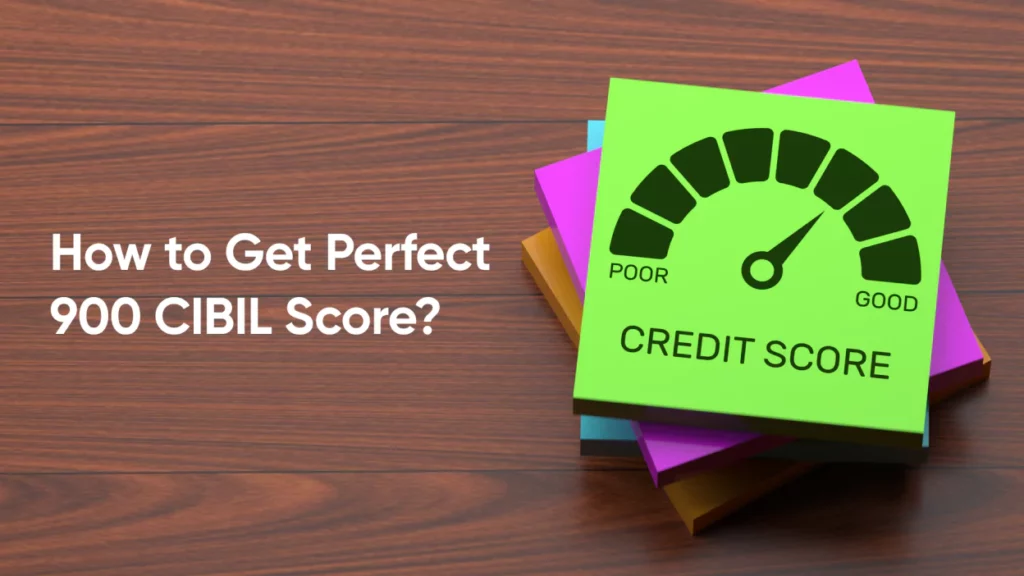How to Get Perfect 900 Credit/CIBIL Score?

A perfect 900 CIBIL score reflects an exceptional repayment history which can open doors to easier access to loans and better interest rates. However, aiming for a 900 score requires financial discipline and a deep understanding of credit factors. To build your CIBIL score effectively, for starters, you will have to ensure timely payments which can significantly boost your score.
Whether you are starting to build your credit history or seeking to elevate your current score, this article will provide straightforward, actionable steps to guide you towards the coveted 900 CIBIL score. We will explore effective strategies such as timely bill payments, credit portfolio diversification, maintaining a low credit utilization ratio, and ensuring your credit report remains error-free.
Table of Contents
ToggleWhat is a 900 Cibil Score?
CIBIL score ranges from 300 to 900, and lenders use it to assess lending risks. A 900 CIBIL score is the highest credit rating, showing top-notch creditworthiness. A score above 750 is good, but 900 is exceptional, marking you as a trustworthy borrower with a flawless credit history and responsible financial habits.
To reach a 900 CIBIL score, focus on timely repayments and wise financial management. This score offers benefits like better loan terms, lower interest rates, and faster approvals. To build your CIBIL score effectively, pay bills on time, manage debts wisely, and monitor your credit report. A 900 score reflects strong financial discipline and opens doors to optimal credit opportunities.
How To Get A 900 CIBIL Score?
To achieve a perfect 900 CIBIL score, focus on these key strategies:
Repay Credit Card Dues on Time:
Consistent payment of credit card dues is crucial, and it accounts for a major portion of your CIBIL score. Consistent on-time payments don’t only help you avoid late fees and high interest but also demonstrate financial reliability. This consistent behaviour is a strong indicator to lenders of your creditworthiness and responsibility in managing debts.
Limit Credit Utilization:
Keeping credit card utilisation below 30% of your available limit is recommended. High utilisation can be perceived as reliance on credit, adversely affecting your score. Regular monitoring and adjusting spending habits to maintain a low utilisation ratio can significantly improve your creditworthiness, as it shows lenders your ability to manage credit effectively without overextending.
Carefully Consider New Credit Cards:
Every new credit card application leads to a hard inquiry. And too many credit inquiries in a short span is perceived as credit hungry behaviour among lenders. It’s important to strategically consider the necessity and benefits of each card.
A well-managed variety of credit cards can positively impact your score by demonstrating responsible credit usage across different accounts, but excessive credit applications can be counterproductive.
Regularly Check Your Credit Report:
Annual or more frequent checks of your credit report are advisable. This enables you to identify inaccuracies or fraudulent activities early. An accurate credit report is essential for a fair credit score. Promptly correcting errors ensures that your credit history accurately reflects your financial behaviour, which is crucial for loan approvals and credit applications.
Opt for Different Types of Credit:
A healthy mix of different types of credit, such as secured (like vehicle loan) and unsecured loans (like personal loans), credit cards, etc. can enhance your credit profile. This mix shows lenders your capability to handle various types of credit responsibly. A diverse credit portfolio can positively influence your credit score, as it demonstrates your financial versatility and reliability in managing different credit forms.
Consider Increasing Your Credit Limit:
Requesting a higher credit limit can be beneficial if managed wisely. A higher limit with controlled spending can significantly lower your credit utilisation ratio, which is beneficial for your score. However, it’s crucial to avoid the temptation of increased spending, as accumulating debt can negate the benefits of a higher limit.
Keep Old Accounts On Your Report:
The length of your credit history contributes significantly to your CIBIL score. Maintaining a good repayment history across older credit accounts can positively impact your score. These accounts provide a longer historical perspective of your credit management, enhancing your credibility and creditworthiness in the eyes of lenders.
Avoid Showing Risk:
Late payments, high debt levels, and defaults are major red flags. These behaviours can significantly lower your score and indicate high risk to potential lenders. Maintaining a clean financial record is crucial for achieving a high credit score. Responsible financial behaviour is key to avoiding these pitfalls.
Limit New Credit Applications:
Multiple credit inquiries in a short period can portray credit hungry behaviour, which can negatively impact your score. Each hard inquiry might slightly reduce your score. It’s advisable to apply for new credit judiciously, as frequent applications can create an impression of financial instability or desperation for credit.
Be Patient And Persistent:
Achieving a perfect CIBIL score is a gradual process that requires consistent adherence to good borrowing practices. Credit history, which forms a significant part of your score, takes time to build. Patience and persistent good credit practices are essential. Regularly engaging in responsible credit behaviour, like timely repayments and prudent credit management, is key to achieving and maintaining a high score.
CIBIL Score Range – What Does It Mean?
Understanding the CIBIL score range is crucial in assessing where you stand in terms of credit health. The good CIBIL score range typically starts from 750, indicating a borrower’s reliability to lenders. However, the best CIBIL score range is above 800, showcasing an exceptional credit history and an excellent repayment track record. How much CIBIL score is good depends largely on the lender’s criteria, but generally, a score above 750 is considered favourable for most credit applications.
The CIBIL score is categorised into different ranges, each signifying a certain level of creditworthiness:
CIBIL Score Range | Rating |
300 – 549 | Poor |
550 – 649 | Fair |
650 – 749 | Good |
750 – 899 | Very Good |
900 | Excellent |
A higher score in the best CIBIL score range not only increases your chances of loan approval but also puts you in a position to negotiate better interest rates. Regularly monitoring and understanding your score within this range is a key step in maintaining financial health.
What Affects Your Credit Scores?
Understanding what influences your CIBIL score is essential for maintaining a good CIBIL score range. These are some of the factors that play a crucial role in determining your credit score:
Payment History: Consistent and timely payments enhance your score, reflecting financial reliability. Conversely, late payments, defaults, and bankruptcies can significantly damage your score. These negative marks can remain on your credit report, continually impacting your creditworthiness.
Owed Amounts: This factor, contributing to nearly 30% of your score. High balances or large debts, especially when close to your credit limits, suggest potential over-leverage and financial stress. Lower balances and a lower credit utilisation ratio across credit cards (ideally below 30%) are viewed favourably, as they indicate responsible credit management and lower credit risk.
Length of Credit History: Longer credit histories contribute positively to your CIBIL score. A lengthy history provides a broader base for assessing your creditworthiness, offering insights into your long-term financial behaviour. It includes the age of your oldest, newest, and average age of all your accounts, reflecting your ability to handle credit.
New Credit: Opening multiple credit accounts in a short time frame can raise red flags, as it may suggest financial desperation or uncontrolled spending. This can temporarily lower your score. Responsible management of new credit, however, can eventually contribute to a positive credit profile.
Credit Mix: A diverse and healthy mix of different credits, such as home loan, car loans or even credit cards, can positively impact your score. A balanced mix of secured and unsecured loans demonstrates financial maturity and responsible credit handling.
Conclusion:
Achieving and maintaining a 900 CIBIL score is a testament to exemplary financial discipline and credit management. Understanding the factors that affect your CIBIL score, such as payment history, owed amounts, and credit mix, is crucial.
Striving for a good CIBIL score not only enhances your creditworthiness but also opens up a realm of favourable financial opportunities. Remember, the journey to a perfect score is a marathon, not a sprint, requiring patience, consistency, and responsible financial behavior.
Frequently Asked Question
A 900 CIBIL score grants access to the most favourable loan conditions, including the lowest interest rates and streamlined credit approvals, making it a highly advantageous financial asset.
Yes, reaching a 900 CIBIL score is achievable through consistent financial discipline, such as perfect credit habits and meticulous financial planning.
To elevate your CIBIL score from 800 to 900, focus on enhancing your payment history, lowering overall debt, and diversifying the types of credit you use.
The CIBIL score peaks at 900, symbolising the highest level of credit trustworthiness and a benchmark for financial dependability.
The lowest possible CIBIL score is 300, indicative of poor credit standing and extremely high risk for lenders.
To surpass an 800 CIBIL score, maintain a low credit utilisation ratio, ensure timely bill payments, and have a balanced mix of credit types.
Individuals with a 900 CIBIL score typically exhibit exceptional credit management skills, no history of defaults, and a consistent record of prompt payments.
The 300 to 900 range in CIBIL scores represents the full spectrum of creditworthiness, from poor to outstanding.
To increase your CIBIL score from 750 to 900, consistently make payments on time, keep credit utilisation low, and avoid new debts.
A strong CIBIL score is generally above 750, reflecting a healthy credit status and a high level of trustworthiness in financial matters.
A CIBIL score of 750 or above is generally considered good, indicating strong creditworthiness and increasing the likelihood of loan or credit card approval.













